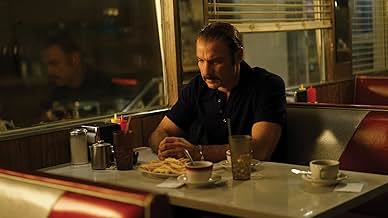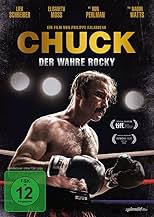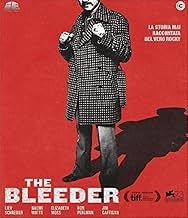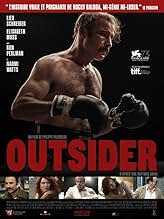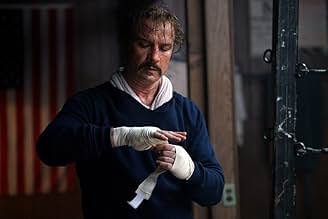CALIFICACIÓN DE IMDb
6.5/10
7.2 k
TU CALIFICACIÓN
Drama inspirado en la biografía del boxeador Chuck Wepner, el hombre que inspiró el personaje de Rocky Balboa.Drama inspirado en la biografía del boxeador Chuck Wepner, el hombre que inspiró el personaje de Rocky Balboa.Drama inspirado en la biografía del boxeador Chuck Wepner, el hombre que inspiró el personaje de Rocky Balboa.
- Dirección
- Guionistas
- Elenco
Opiniones destacadas
Philippe Falardeau, the acclaimed director of The Good Lie and the Oscar nominated Monsieur Lazhar comes forth with a period piece of New Jersey in the 1970's with a new film, The Bleeder, a drama, starring Liev Schreiber, known for his television role as Ray Donovan in the series "Ray Donovan," and as Marty Baron in last year's Oscar-winning Best Picture, Spotlight. Schreiber portrays boxer Chuck Wepner, the heavyweight champion of New Jersey, and often known more colorfully as the Bayonne Bleeder.
When he wasn't in the ring, Wepner was a liquor salesman on the mean streets of New Jersey who managed to last 15 rounds in a professional boxing match with the greatest fighter of all-time – Muhammad Ali. Legendary boxing promoter Don King wanted a race fight and sought out a white fighter to get into the ring with the Champ, Muhammad Ali.
Wepner seemed to be a good choice to be Ali's punching bag. Wepner had a reputation for being able to take a punch. And, true to King's intention, Wepner took a beating. Not as though it was anything new for Wepner. In his ten years as a boxer he had his nose broken eight times, had 133 stitches, suffered fourteen losses and two knockouts. He was once pummeled so badly by Sonny Liston suffering both a broken nose and a broken cheekbone that required extensive stitching to heal.
Yet, Wepner had managed to put together a string of good fights and began to believe and have faith that his dream of getting a title shot was in reach. While not a great fighter, Wepner was known for his big heart, his ability to take a beating and come back for more. As a matter of record, Wepner became the first man to knock Ali off his feet inside the ring during a title fight. A furious Ali got back up and pulverized Wepner without mercy culminating in the fight ending 19 seconds into the 15th round. Sylvester Stallone based his Rocky franchise on Wepner's life.
Director Falardeau exquisitely turns what might easily have been another boxing movie into a relationship piece illuminating Wepner's most difficult moments outside the ring. He depicts the 1970's much like Martin Scorcese's Taxi Driver – seedy, wild women, drugs, booze – along with exceptional highs and disastrous lows.
After Rocky became the hit of 1976 garnering ten Oscar nominations and three wins for Best Picture, Best Director and for Best Editing, Wepner began letting the world of New Jersey nightlife know he was the real life Rocky and to many he was. Jim Gaffigan plays, John Stoehr, Wepner's best friend and loyal steward who is shown as mostly living vicariously through Chuck. A most telling scene occurs when Cinematographer Nicolas Bolduc takes the audience down inside the clubbing world of the honky-tonk, disco era of the 1970's with the fur coats, gold chains, silky rayon tops, sequined gowns, costume jewelry and the dance music of the Bee Gee's. Here Wepner not only succumbs to the temptation of the drugs, booze and casual sex, he ultimately seems to confuse his own life with the screen life of Rocky Balboa as John looks on in giddy bewilderment.
Soon Wepner decides to confronts Stallone about Rocky. Stallone, played by Morgan Spector, seems genuinely flattered and invites Wepner to audition for a real-life role in Rocky II. A drug infused, boozed up Wepner, blows the audition as his life is now in a virulent downward spiral. Finally, after he shows up late and misses his 2nd grade daughter's Parents Day, his wife, Phyllis, played by Elisabeth Moss calls it quits. Wepner knows he's falling. Yet, he finds a glimpse of hope with a local bartender, Linda, played by Schreiber's real-life wife, Naomi Watts. The two hit it off with some playful banter before the bottom drops out for Wepner and he's sent to prison for drug trafficking. This becomes Stallone's impetus for his 1989 film Lock Up. Wepner is called upon to be a consultant and is shown in shackles and prison garb. Yet, when he sees Stallone staging the story, he realizes his life is not Stallone's version. This is the turning point of the film and for Chuck Wepner. He reconciles with his brother John, played sharply by Michael Rappaport and eventually marries Linda and the two spend the rest of their lives together in close relationship.
The Bleeder, full of rich costuming and fine cinematography, is at its core a period piece of the 1970's including the role boxing played in the public domain. In addition, it is also a strong narrative of the trials and tribulations of Chuck Wepner's life. It's a life affirming story as Wepner goes the distance and gets the girl in the end. Warmly recommended.
When he wasn't in the ring, Wepner was a liquor salesman on the mean streets of New Jersey who managed to last 15 rounds in a professional boxing match with the greatest fighter of all-time – Muhammad Ali. Legendary boxing promoter Don King wanted a race fight and sought out a white fighter to get into the ring with the Champ, Muhammad Ali.
Wepner seemed to be a good choice to be Ali's punching bag. Wepner had a reputation for being able to take a punch. And, true to King's intention, Wepner took a beating. Not as though it was anything new for Wepner. In his ten years as a boxer he had his nose broken eight times, had 133 stitches, suffered fourteen losses and two knockouts. He was once pummeled so badly by Sonny Liston suffering both a broken nose and a broken cheekbone that required extensive stitching to heal.
Yet, Wepner had managed to put together a string of good fights and began to believe and have faith that his dream of getting a title shot was in reach. While not a great fighter, Wepner was known for his big heart, his ability to take a beating and come back for more. As a matter of record, Wepner became the first man to knock Ali off his feet inside the ring during a title fight. A furious Ali got back up and pulverized Wepner without mercy culminating in the fight ending 19 seconds into the 15th round. Sylvester Stallone based his Rocky franchise on Wepner's life.
Director Falardeau exquisitely turns what might easily have been another boxing movie into a relationship piece illuminating Wepner's most difficult moments outside the ring. He depicts the 1970's much like Martin Scorcese's Taxi Driver – seedy, wild women, drugs, booze – along with exceptional highs and disastrous lows.
After Rocky became the hit of 1976 garnering ten Oscar nominations and three wins for Best Picture, Best Director and for Best Editing, Wepner began letting the world of New Jersey nightlife know he was the real life Rocky and to many he was. Jim Gaffigan plays, John Stoehr, Wepner's best friend and loyal steward who is shown as mostly living vicariously through Chuck. A most telling scene occurs when Cinematographer Nicolas Bolduc takes the audience down inside the clubbing world of the honky-tonk, disco era of the 1970's with the fur coats, gold chains, silky rayon tops, sequined gowns, costume jewelry and the dance music of the Bee Gee's. Here Wepner not only succumbs to the temptation of the drugs, booze and casual sex, he ultimately seems to confuse his own life with the screen life of Rocky Balboa as John looks on in giddy bewilderment.
Soon Wepner decides to confronts Stallone about Rocky. Stallone, played by Morgan Spector, seems genuinely flattered and invites Wepner to audition for a real-life role in Rocky II. A drug infused, boozed up Wepner, blows the audition as his life is now in a virulent downward spiral. Finally, after he shows up late and misses his 2nd grade daughter's Parents Day, his wife, Phyllis, played by Elisabeth Moss calls it quits. Wepner knows he's falling. Yet, he finds a glimpse of hope with a local bartender, Linda, played by Schreiber's real-life wife, Naomi Watts. The two hit it off with some playful banter before the bottom drops out for Wepner and he's sent to prison for drug trafficking. This becomes Stallone's impetus for his 1989 film Lock Up. Wepner is called upon to be a consultant and is shown in shackles and prison garb. Yet, when he sees Stallone staging the story, he realizes his life is not Stallone's version. This is the turning point of the film and for Chuck Wepner. He reconciles with his brother John, played sharply by Michael Rappaport and eventually marries Linda and the two spend the rest of their lives together in close relationship.
The Bleeder, full of rich costuming and fine cinematography, is at its core a period piece of the 1970's including the role boxing played in the public domain. In addition, it is also a strong narrative of the trials and tribulations of Chuck Wepner's life. It's a life affirming story as Wepner goes the distance and gets the girl in the end. Warmly recommended.
The first thing Chuck did right was it allowed me to be immersed into this world. The film takes place in the 60's and 70's, and I felt like I was right there! Everything from the costumes to the production design to being made on film, it all worked to create a very vintage look. I felt like I was right with these characters, and I think all the time and care that went into crafting the look of the film needs to be recognized. To take it a step further, the performances are what ultimately sold me. Sure, everything looked gorgeous and vintage, but I was not watching actors; I was watching characters. And that was key in selling me on this world they were displaying. Schrieber is fantastic in this movie! This may be the strongest performance I've seen him give. He, and everyone else too, was almost unrecognizable. This character could easily have been played as one-note, but Schrieber brought so many different layers to him. You understand that he's a really despicable guy, but Schrieber lets you see that he's really a broken man who has lost his way. You're not exactly sure whether Chuck is the protagonist or the antagonist, but it's the subtlety of Schrieber's acting that really lets you buy into this complex character.
This is a really good film. It's based on the true story that inspired Sylvester Stallone's Rocky movie. It has everything you want, every single actor is perfect in every way. I didn't know who was in it when I started watching and the well known actors revealed along the way sometimes took a minute or two before you knew who they were. Every single frame of this was well done. Highly recommended for folks who like paced movies about extraordinary 'normal' people. Lots of reunioning big and small screen actors came together to make this.
"Chuck" is one interesting and dark biopic tale of fame and the fall that one can take when they don't know how to deal with the success and money that brings along vices. Anyway most movie and sports fans are familiar with the story of how Sly Stallone brought about the story of "Rocky" it was thru the boxing match of little known Chuck Wepner and when he faced "The Greatest" Muhammad Ali and took him the distance in a real life bout. And this picture tells the story pretty well.
"Chuck" is an up and down story of good times and bad times it's a roller coaster ride of hope, luck, inspiration, and reflection of life. Set in 1970's New Jersey boxer Chuck Wepner(in a good turn from Liev Schreiber)gets the title shot of his life against Muhammad Ali and the "Bayonne Bleeder" goes the distance in a tough loss, and this becomes the inspiration for the real movie "Rocky".
After becoming a celebrity with fame and money the abuse of cocaine and alcohol becomes so common for Chuck and he drifts away from his wife(Elisabeth Moss) and family so self destruction is so the norm as Chuck's life goes down the drain and even serves a prison stint. Thru it all this guy is a bleeder of life and determination a fighter. As Chuck even starts a new romance with a new lady(played by Naomi Watts).
The film has a mix of past footage from the actual fight and the picture is told thru Chuck's voice as he recounts his life and times and the 1970's period is captured just fine. Overall good real life story about the rise of fame and it's a showcase of struggle and redemption, proving not always if you win or lose, but it matters if you go the distance.
"Chuck" is an up and down story of good times and bad times it's a roller coaster ride of hope, luck, inspiration, and reflection of life. Set in 1970's New Jersey boxer Chuck Wepner(in a good turn from Liev Schreiber)gets the title shot of his life against Muhammad Ali and the "Bayonne Bleeder" goes the distance in a tough loss, and this becomes the inspiration for the real movie "Rocky".
After becoming a celebrity with fame and money the abuse of cocaine and alcohol becomes so common for Chuck and he drifts away from his wife(Elisabeth Moss) and family so self destruction is so the norm as Chuck's life goes down the drain and even serves a prison stint. Thru it all this guy is a bleeder of life and determination a fighter. As Chuck even starts a new romance with a new lady(played by Naomi Watts).
The film has a mix of past footage from the actual fight and the picture is told thru Chuck's voice as he recounts his life and times and the 1970's period is captured just fine. Overall good real life story about the rise of fame and it's a showcase of struggle and redemption, proving not always if you win or lose, but it matters if you go the distance.
Chuck Wepner is not my idea of a recommendable character but CHUCK, the film, manages to keep a steady, neutral position, and not make any judgments about his nature. It just shows Wepner as someone easily impressionable and immature, but who, in the ring, is determined to go the distance, come hell or Muhammad Ali.
Clearly, his marriage to Phyllis was an error and having a daughter even more so because Wepner was completely absorbed in his boxing exploits, his side jobs, his sexual conquests and, ultimately, his identification with the tragic role played by Anthony Quinn in REQUIEM FOR A HEAVYWEIGHT, to the point of knowing his lines off by heart and feeling that he shares something with that unfortunate soul; and his fascination with the film, ROCKY, and its central character and rising movie star Sylvester Stallone, to the point of celebrating that film's Best Picture and Best Director awards as if they were his own, and of almost making Balboa his alter ego, all reflect his scattered personality and weakness of purpose.
That fascination with a celluloid, larger than life, hero also causes him to jump the boundaries of safe life into the dangers of drug addiction. I find the film brutally honest about that and about his break-up with his wife, played with considerable aplomb and force by Elisabeth Moss, as someone who refuses to be duped by the fake world of boxing, movies, and other illusions entertained by Wepner.
The scene where Schreiber (Wepner) goes to his daughter's school and completely misses the plot, partly because he is under the influence of drugs, is a classic in its simplicity, truth, and quality of acting by all involved.
Wepner's honesty about his boxing limitations is a point in his favor, and one that allows the viewer to develop some sympathy for the man.
I also found the Wepner-Stallone relationship very effectively and succinctly observed. Clearly, in real life Stallone is not the good guy that Balboa was. Stallone did nothing to assist Wepner, with bail for instance, when he was tried and jailed for drug possession. And yet Stallone used Wepner as the source for his script of ROCKY, earning considerable fortune and fame as a result. The scene where Stallone is doing press ups in the jail facility where Wepner is an inmate, all to do with ROCKY III and Balboa's descent from grace and into jail, is also very effectively put across, with not a frame too many.
Wepner's friend, John Stahl, clearly was not a good influence, and did not mind riding his pal's wave of fame, womanizing, drug taking, and so forth, but never there when really needed, with any really helpful contribution. He comes across as a party parasite with a sense of humor, and reminds you of just how dangerous such friendships can be.
There are, however, characters who restore hope in mankind: Phyllis is a really good and caring wife, someone whose honesty and real love for Wepner allow her to see that their relationship cannot go on, and has the courage to break it off; Linda, Wepner's second wife, is more detached but has the right values. And Wepner earns our respect for seeing Stallone for what he is.
Best of all, Wepner's brother, Donny, who steps in to help his undeserving brother. He complains bitterly about Wepner's selfishness, but you wish everyone were as honest and caring, and this would be a far better world.
Falardeau's direction is assured and extremely competent. No fancy camera work, good use of boxing footage from the time, and he extracts credible and keenly felt performances from the entire cast. Schreiber is very good, Moss superlative, Watts in an unusually self-effacing role that serves her well -- but it is the actor (I do not know his name) who plays the small role of Donny, Wepner's brother, that really stays with me for the sheer honesty and naturalism of his acting.
Competent script, too, keeping as close to real life as possible. Unfortunately, the source material would never permit the kind of emotional uplift that could have rendered CHUCK a masterpiece in the restricted niche of sports-related movies - but it is definitely worth watching.
Clearly, his marriage to Phyllis was an error and having a daughter even more so because Wepner was completely absorbed in his boxing exploits, his side jobs, his sexual conquests and, ultimately, his identification with the tragic role played by Anthony Quinn in REQUIEM FOR A HEAVYWEIGHT, to the point of knowing his lines off by heart and feeling that he shares something with that unfortunate soul; and his fascination with the film, ROCKY, and its central character and rising movie star Sylvester Stallone, to the point of celebrating that film's Best Picture and Best Director awards as if they were his own, and of almost making Balboa his alter ego, all reflect his scattered personality and weakness of purpose.
That fascination with a celluloid, larger than life, hero also causes him to jump the boundaries of safe life into the dangers of drug addiction. I find the film brutally honest about that and about his break-up with his wife, played with considerable aplomb and force by Elisabeth Moss, as someone who refuses to be duped by the fake world of boxing, movies, and other illusions entertained by Wepner.
The scene where Schreiber (Wepner) goes to his daughter's school and completely misses the plot, partly because he is under the influence of drugs, is a classic in its simplicity, truth, and quality of acting by all involved.
Wepner's honesty about his boxing limitations is a point in his favor, and one that allows the viewer to develop some sympathy for the man.
I also found the Wepner-Stallone relationship very effectively and succinctly observed. Clearly, in real life Stallone is not the good guy that Balboa was. Stallone did nothing to assist Wepner, with bail for instance, when he was tried and jailed for drug possession. And yet Stallone used Wepner as the source for his script of ROCKY, earning considerable fortune and fame as a result. The scene where Stallone is doing press ups in the jail facility where Wepner is an inmate, all to do with ROCKY III and Balboa's descent from grace and into jail, is also very effectively put across, with not a frame too many.
Wepner's friend, John Stahl, clearly was not a good influence, and did not mind riding his pal's wave of fame, womanizing, drug taking, and so forth, but never there when really needed, with any really helpful contribution. He comes across as a party parasite with a sense of humor, and reminds you of just how dangerous such friendships can be.
There are, however, characters who restore hope in mankind: Phyllis is a really good and caring wife, someone whose honesty and real love for Wepner allow her to see that their relationship cannot go on, and has the courage to break it off; Linda, Wepner's second wife, is more detached but has the right values. And Wepner earns our respect for seeing Stallone for what he is.
Best of all, Wepner's brother, Donny, who steps in to help his undeserving brother. He complains bitterly about Wepner's selfishness, but you wish everyone were as honest and caring, and this would be a far better world.
Falardeau's direction is assured and extremely competent. No fancy camera work, good use of boxing footage from the time, and he extracts credible and keenly felt performances from the entire cast. Schreiber is very good, Moss superlative, Watts in an unusually self-effacing role that serves her well -- but it is the actor (I do not know his name) who plays the small role of Donny, Wepner's brother, that really stays with me for the sheer honesty and naturalism of his acting.
Competent script, too, keeping as close to real life as possible. Unfortunately, the source material would never permit the kind of emotional uplift that could have rendered CHUCK a masterpiece in the restricted niche of sports-related movies - but it is definitely worth watching.
¿Sabías que…?
- TriviaChristina Hendricks was cast alongside Naomi Watts and Liev Schreiber back in 2011 when the project was announced. Hendricks dropped out while the film was stuck in development and eventually Elisabeth Moss replaced her.
- ErroresChuck Wepner served his prison time in East Jersey State Prison in Rahway, NJ, not Northern State Prison in Newark, NJ, as depicted in the movie. This is where he met Sylvester Stallone while filming "Lock Up" in 1989.
- Citas
Chuck Wepner: What good was backing up gonna do? Look, my thing was this: I couldn't hit him, so I figured I'd wear him down with my face. It was working great for five or six rounds...
- ConexionesFeatured in The Cine-Masochist: CHUCK WEPNER VS ROCKY BALBOA (2021)
Selecciones populares
Inicia sesión para calificar y agrega a la lista de videos para obtener recomendaciones personalizadas
- How long is Chuck?Con tecnología de Alexa
Detalles
Taquilla
- Total en EE. UU. y Canadá
- USD 320,725
- Fin de semana de estreno en EE. UU. y Canadá
- USD 34,565
- 7 may 2017
- Total a nivel mundial
- USD 502,518
- Tiempo de ejecución1 hora 38 minutos
- Relación de aspecto
- 1.85 : 1
Contribuir a esta página
Sugiere una edición o agrega el contenido que falta

Principales brechas de datos
What is the French language plot outline for The Bleeder (2016)?
Responda



